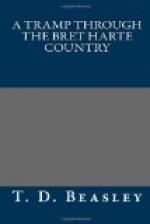I have not the slightest doubt that sheer love of the road — and only a tramp knows what those words mean — is the controlling influence which keeps fifty per cent of the fraternity its willing slaves. What was Senhouse — that most fascinating of Maurice Hewlett’s creations — but a tramp? A gentleman tramp, if you please, but still a tramp. What is the reason that Senhouse appeals so strongly to the imagination? Simply because he loved Nature. And in this matter-of-fact period when poetry is dead and even a by-word, the man who loves Nature, if not a poet, at least has poetry in his soul. In a decadent age symbolized by the tango and the problem play, it is at least an encouraging sign for the future that such a character as Senhouse came to the jaded reader of the erotic fiction of the day, as a whiff of sea breeze on a parched plain, and was hailed with corresponding delight.
Of course there are “hoboes” and “hoboes,” as in any other profession, but so far as my experience goes, the “hobo” is an idealist. Of the many reasons he has taken to the road, not the least is the freedom from the shackles of convention and the “Gradgrind” methods of an utilitarian and materialistic age. Nor is he a pessimist. Whatever his trouble, the road has eased him of his burden and made him a philosopher.
Thoreau, writing in the middle of the last century, deplores the fact that in his day, as now, but few of his countrymen took any pleasure in walking, and that very rarely one encountered a person with any real appreciation of the beauty of Nature, which if he could but see it, lay at his very door. Speaking for himself and companion in his rambles, he says: “We have felt that we almost alone hereabouts (Concord, Massachusetts) practiced this noble art; though, to tell the truth, at least if their own assertions are to be received, most of my townsmen would fain walk sometimes, as I do, but they cannot. No wealth can buy the requisite leisure, freedom and independence which are the capital in this profession. It comes only by the grace of God. It requires a direct dispensation from Heaven to become a Walker. Ambulator nascitur non fit. Some of my townsmen, it is true, can remember and have described to me, walks which they took ten years ago, in which they were so blessed as to lose themselves for half an hour in the woods.”
Who is there who walks habitually, who does not know the man who tells you of the walks he “used to take?” You have known him, say a dozen years. During all that time, to your knowledge, his walks have practically been limited by the distance to his office and back from the ferry boat. When you urge him for perhaps the twentieth time, to essay a tramp with you, he will say he would like to very much, but unfortunately so-and-so renders it impossible. And then looking you in the eye, he will tell you how much he enjoyed tramps he took, of twenty or thirty miles — but that was before you knew him! As if a Walker with a big “W,” as Thoreau writes the word, would remain satisfied with the memory of walks of twenty years ago!




